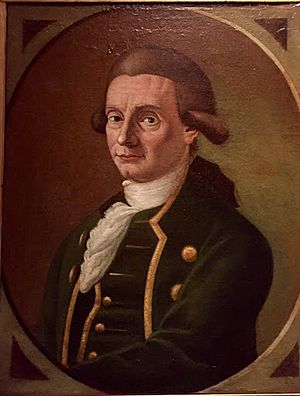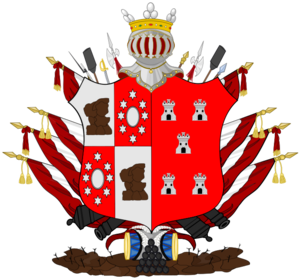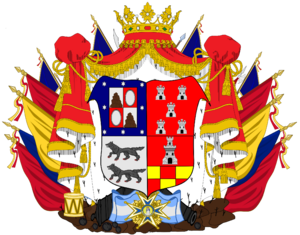Antonio de Olaguer y Feliú facts for kids
Quick facts for kids
Antonio de Olaguer y Feliú
|
|
|---|---|
 |
|
| Viceroy of the Río de la Plata | |
| In office 1797–1799 |
|
| Monarch | Charles IV |
| Personal details | |
| Born |
Antonio de Olaguer Feliú Heredia
14 October 1742 El Bierzo, Spain |
| Died | 19 May 1813 Madrid, Spain |
| Nationality | |
| Spouse | Ana de Azcuénaga |
| Occupation | Politician |
| Profession | Military man |
| Military service | |
| Allegiance | Spain |
| Branch/service | Spanish Army |
| Rank | General |
Antonio Olaguer Feliú y Heredia López y Domec (1742–1813) was an important Spanish soldier and politician. He spent a big part of his career in South America. He is known for being the Viceroy of the Río de la Plata.
Contents
Life and Career
Early Life and Military Service
Antonio Olaguer Feliú was born in a place called Villafranca del Bierzo in Spain. He was sent to Buenos Aires as a military expert. This was during the time when Pedro de Cevallos was governor. In 1777, Antonio took part in the siege of Colonia del Sacramento. Later, in 1783, he was made a military inspector.
Governor of Montevideo
From 1790 to 1797, Antonio Olaguer Feliú served as the Governor of Montevideo. This was an important role in the region. In 1792, he was promoted to the rank of Field Marshal. This is a very high rank in the military.
Viceroy of the Río de la Plata
After being governor, Antonio Olaguer Feliú became the Viceroy of the Río de la Plata. He held this powerful position from 1797 to 1799.
During his time as Viceroy, he faced many challenges. There were forces from the British and Portuguese in the Río de la Plata area. Also, new ideas about revolution were spreading. These ideas were inspired by the recent French Revolution.
To help the economy, he opened the port of Buenos Aires to ships from other countries. This was done to help trade, which was suffering because of problems between European countries.
Return to Spain and Later Life
When he returned to Spain, King Charles IV appointed him as the Secretary of War. This meant he was in charge of the country's military affairs. Antonio Olaguer Feliú passed away in Madrid, Spain, in 1813. He was married to Ana de Azcuénaga de Olaguer Feliú.
See also
 In Spanish: Antonio Olaguer Feliú para niños
In Spanish: Antonio Olaguer Feliú para niños
 | Delilah Pierce |
 | Gordon Parks |
 | Augusta Savage |
 | Charles Ethan Porter |



